Founding The Positivity Project: Forging Cohesion Through Character and Relationships
By Christine Fennessy“How do you unify a secure, wealthy country that has sunk into a zero-sum political game with itself? How do you make veterans feel that they are returning to a cohesive society that was worth fighting for in the first place?”
—Sebastian Junger
Both Mike Erwin and Jeff Bryan have young kids. And they think a lot about the country they want for their children.
It will be a country where people are healthy and happy and have meaning in their lives. It will be a country where people value relationships—and see an individual’s character as more important than an individual’s status.
It will be a democracy in which people can passionately disagree with each other, yet not hate each other because they share a common vocabulary to understand and appreciate what is good in people. While that might sound obvious that the United States will be a democracy, Mike and Jeff know that democracy is not a given. Democracy is hard. It requires respect and relationships and an emphasis on how we treat each other.
They believe that a country in which people, individually and collectively, prioritize character strengths and positive relationships is going to be strong, healthy, resilient—and prepared to meet the challenges of the future.
This is the country Mike and Jeff want to create for future generations. And so they work for it hard every day because it’s their duty. It’s their mission to invest in this country’s future citizens, its future leaders. As veterans with five deployments between them, they have thought deeply about those questions posed by Sebastian Junger. They know how disorienting and devastating it can be to transition from a world in which relationships literally keep people alive to a world that is fractured and divided and differences count more than character.
They thought a lot about how they could change that. How they could build a stronger, more unified country. A country they are proud to hand over to their children, to return to the veterans.
The Positivity Project is their answer.
*****
The Positivity Project is based on 24 character strengths and the mindset that “other people matter.”
The program is a daily, 15-minute curriculum for students in kindergarten through 12th grade designed to help them build positive relationships. The idea is simple and profound: When kids understand what character is—what words like integrity, humility, fairness, perspective, and gratitude really mean and look like in action—they begin to see those traits in themselves.
They begin to believe that they are good and worthy not because of what they can do in the classroom or on the soccer field, but because of who they are as a classmate or a teammate.
When they can recognize and understand these traits in themselves, they have a better understanding of who they are as a person, as a friend. Perhaps they are creative, optimistic, and brave. Or maybe they are curious, open-minded, and kind.
With The Positivity Project, kids learn to recognize, appreciate, and articulate such traits in others. And it’s that understanding of character, of the “who” rather than the “what” of a person, of the simple mantra that “other people matter,” that is the bedrock of authentic relationships.
*****
After graduating from West Point and serving a combined 18 years of active duty including 5 deployments with 52 months downrange, Mike and Jeff understood the value of authentic relationships.
For Jeff, who deployed twice to Iraq, first as a platoon leader then as an engagements officer, that authenticity was evident when soldiers asked for him specifically to be their platoon leader during his first deployment. When he and his interpreter got so close they could read and anticipate each other’s moves and operate in a near state of flow. When the informant network they built together yielded measurable results without placing undue hardship on local people. When an Iraqi citizen whose trust Jeff gained helped calm a mob on his platoon’s behalf. When he removed his helmet and vest and drank tea during meetings with sheiks and politicians and business leaders and really tried to get to know them.
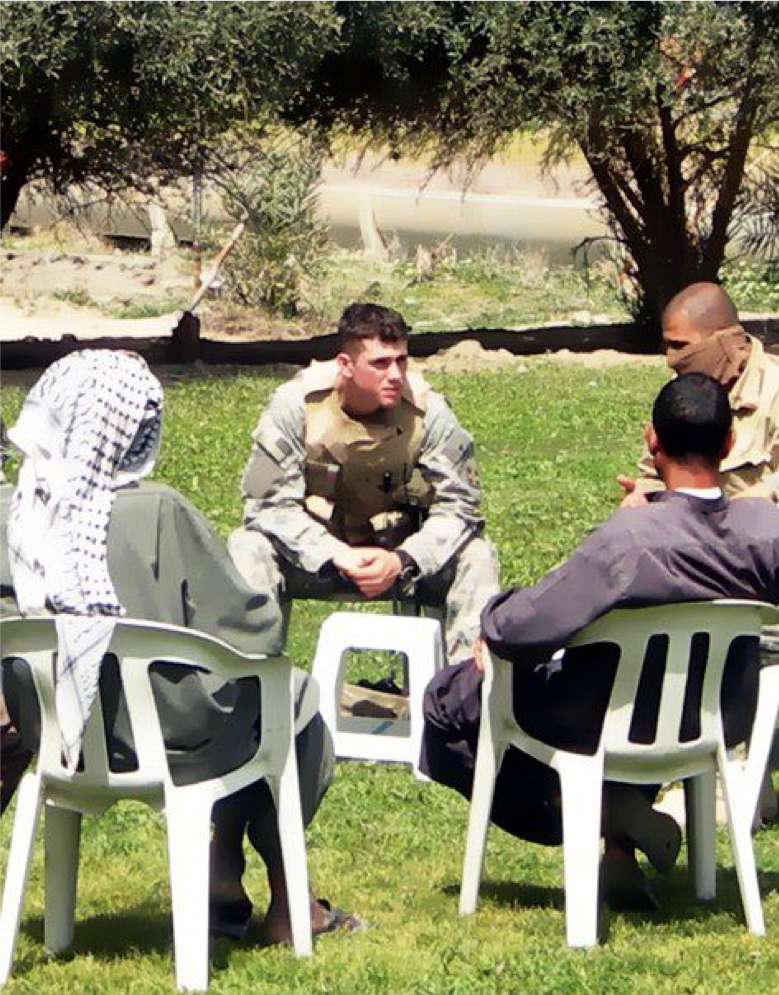
Jeff and his interpreter speaking with Iraqi citizens northwest of Baghdad in 2006.
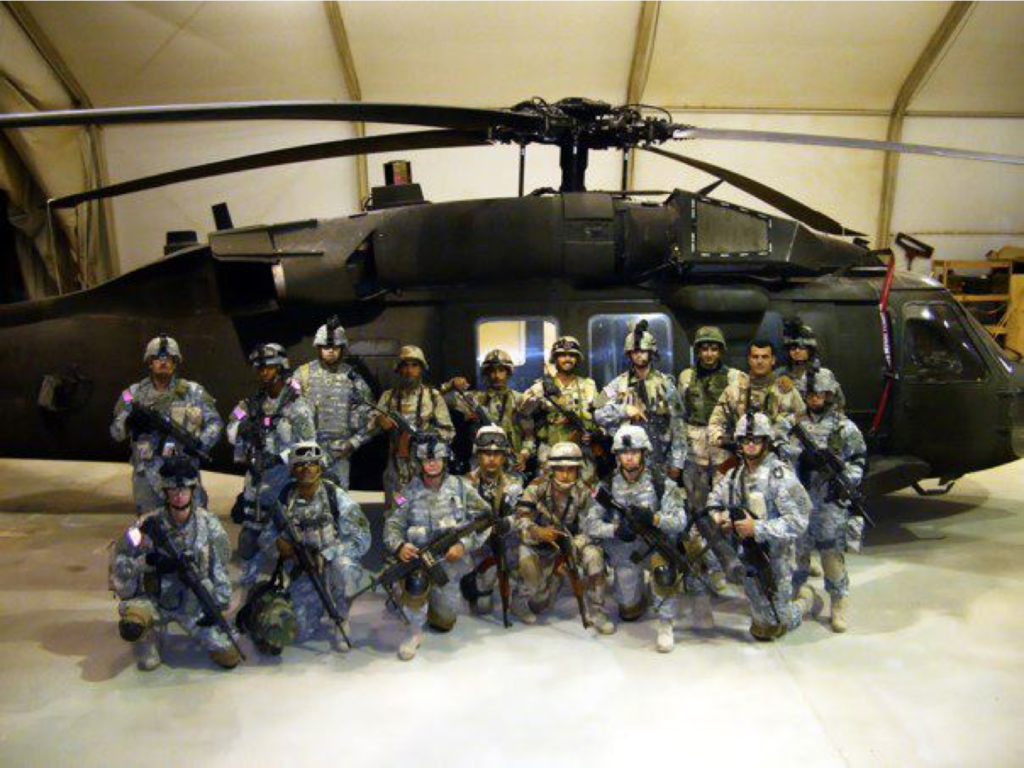
Jeff’s platoon and Iraqi Army soldiers preparing for an air insertion in 2006.
Mike, an intelligence officer who deployed once to Iraq and twice to Afghanistan, felt that authenticity when his boss said, “We need you.” And for 34 days during the Battle of Najaf—in 115-degree heat with no showers or fresh water—he led a team of eight providing intelligence to 400 soldiers about how the enemy would attack, a job that, on paper at least, he wasn’t qualified to perform. He felt it in Afghanistan when Special Forces soldiers pleaded with him to make the case for a mission by going over the head of a colonel in a very public way. A mission that ultimately yielded thousands of pounds of opium and explosives, weakened the insurgency, and saved the lives of Marines on the ground.
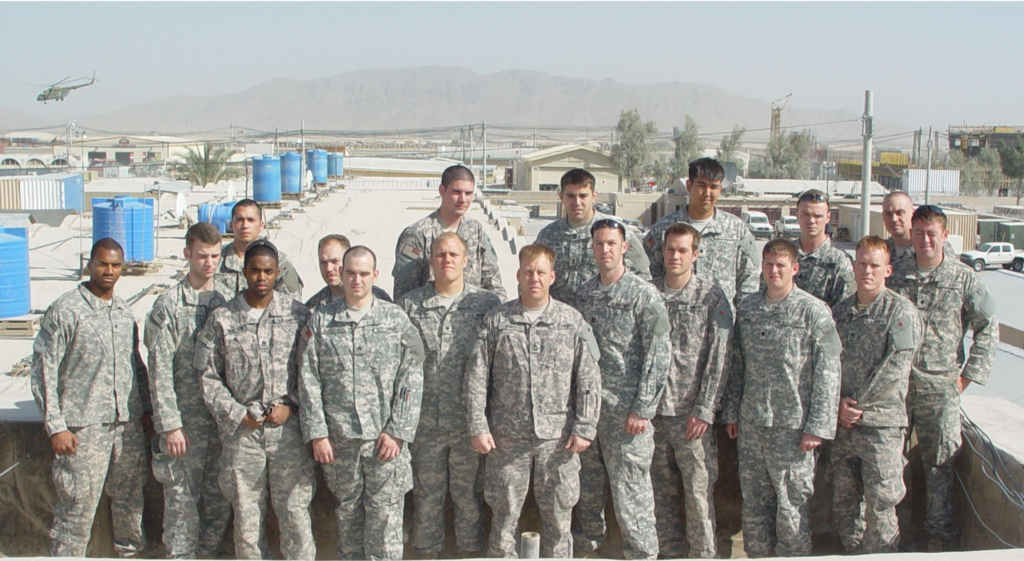
Mike and his intelligence section in Afghanistan in 2008.
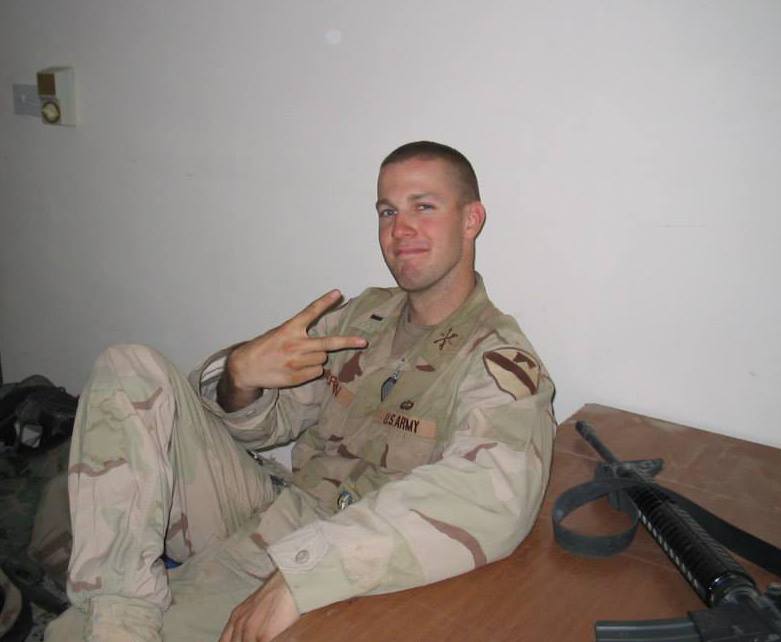
Mike following the Battle of Najaf in 2004.
Experiencing such authentic relationships, however, those built on integrity and bravery, leadership and teamwork, purpose and prudence, can make their absence more stark.
Jeff left the Army after five years, went to graduate school, and worked for a time at the State Department and in the private sector. His colleagues now seemed more self-interested, and for the most part, he understood why. In the civilian world, unlike the military (generally speaking), a paycheck isn’t a given, and so he got the whole “looking out for number one” mentality. But with that self-interest came a disconnect that was harder to reconcile. A misalignment of thoughts, words, and actions, especially among those in leadership positions. A lack of integrity that made it hard to make an impact and live the life of service he’d envisioned.
After seven years, Mike got orders to leave Afghanistan and attend graduate school to prepare for a teaching assignment at West Point. In a matter of weeks, he went from studying the threat of improvised explosive devices in Kandahar to studying psychology in Ann Arbor. In the personality psychology program at the University of Michigan, the students were nearly all in their early 20s and nearly all focused on fields that emphasized how people were different. Mike was a 30-year-old West Point graduate, a captain in the Army, and a leader who had spent 28 months downrange focused on what brought people together. His job had been to galvanize people, to bring them together to accomplish the mission. To him, focusing on differences got in the way of teamwork and progress.
It was wildly disorienting. And often unbearably lonely. Punctuating it all was a crushing guilt over leaving his fellow soldiers behind. His friends were dying and getting seriously injured in Afghanistan and he was in school.
He didn’t know it, but the confusion, isolation, and sadness primed him for the message of a field called positive psychology and a guy named Dr. Chris Peterson.
The 815-page handbook uses history, philosophy, and scientific rigor to describe the essential traits that make humans good. In it, Peterson writes that positive psychology isn’t about the ‘stress-free individual;’ on the contrary, the field considers adversity as integral to character strengths.
Positive psychology is the scientific study of what makes life worth living and focuses on, among other things, positive influences and events. Chris co-founded the field in 1998 and co-authored its definitive text, Character Strengths and Virtues. The 815-page handbook uses history, philosophy, and scientific rigor to describe the essential traits that make humans good.
In it, Peterson writes that positive psychology isn’t about the “stress-free individual;” on the contrary, the field considers adversity as integral to character strengths. Nor is it specific to any single group or period of time. Rather, “there is a strong convergence across time, place, and intellectual tradition about certain core virtues.” Finally, the 24 character strengths are not random selections, but may in fact have been evolutionarily advantageous, allowing humans to thrive: “The ubiquitous virtues, we believe, are what allow the human animal to struggle against and to triumph over what is darkest within us.”
It resonated with Mike. Instead of dwelling on differences and weakness, positive psychology focused on unity and strength. On what people did right. On the idea, as Chris often said, that “other people matter.” With the language of positive psychology, Mike could better articulate what was missing in his life, namely, an authentic sense of connection to the people around him. It struck him how many other veterans probably felt the same way—or much worse. He was still in the Army, after all; if he felt unmoored and alone as an active duty soldier on a campus, he couldn’t imagine what it felt like for veterans who no longer wore the uniform. Who had to construct a whole new identity and find a new community.
Instead of dwelling on differences and weakness, positive psychology focused on unity and strength.
Inspired by Chris and his research, Mike launched Team Red, White & Blue seven months into his first year as a graduate student. Drawing from the tenets of positive psychology, the nonprofit’s mission was to enrich the lives of veterans by connecting them to their community through physical and social activity. Today, Team RWB has more than 140,000 veteran and civilian members.
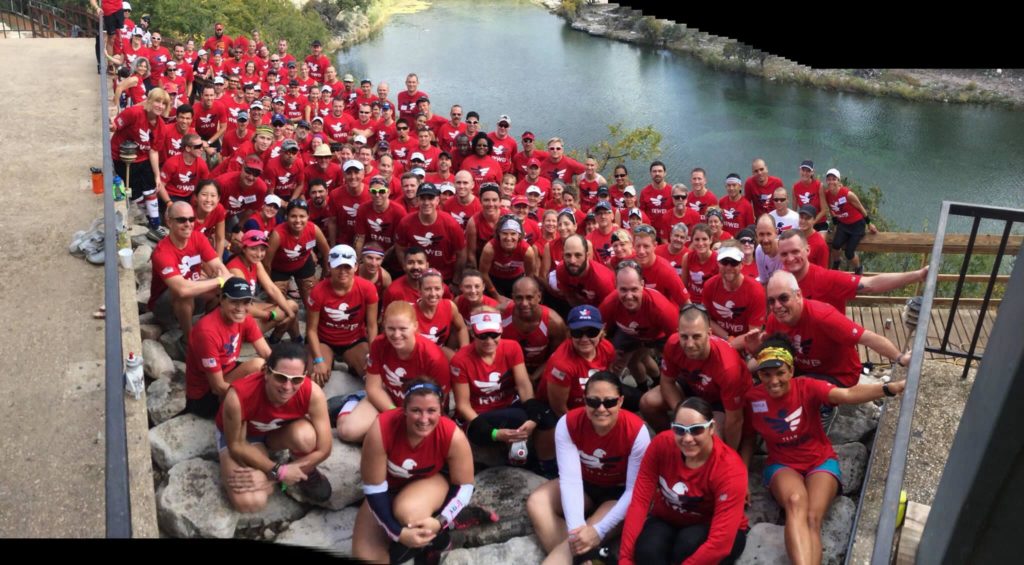
Team Red, White & Blue members at a trail running camp in Texas.
Mike has a tough time articulating why he gets emotional talking about Chris. Why his voice sometimes cracks and his eyes redden. Chris was his professor and mentor, but he was also a steady presence during an emotionally charged time. He was even-keeled and level-headed, the kind of person with whom it was tough to tell if he’d just won the lottery or lost his wallet.
Chris hadn’t been in the military, but he had a “Proud Veteran Supporter” sign outside his office door. He’d advocated for Mike to be the first active duty soldier to enroll in the university’s psychology program and then he’d asked a retired general how he could best support an Army captain with three deployments in the hyper-liberal, hyper-laid back environment of academia. When the general told Chris, “Just let him be a graduate student,” that’s exactly what he did: He let Mike discover his own path. And the more Mike learned about positive psychology, the more he saw Chris as an intellectual father figure. A man whose ideas—about looking at people through the lens of character and prioritizing relationships—were literally changing his life and charting the course for his future, not only as a social entrepreneur dedicated to the greater good, but as a son, a brother, a husband, father, and friend.
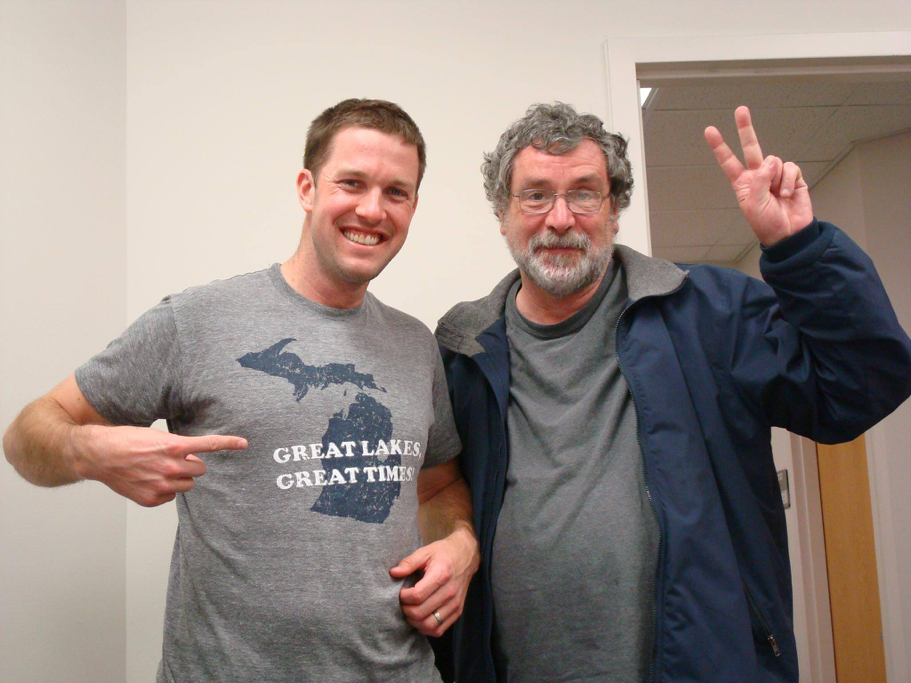
Mike and Chris Peterson at the University of Michigan in 2010.
And that’s why Mike will always remember October 9, 2012 as one of the few times in his life when he broke down completely. By then he was teaching psychology at West Point, and after getting the news on his drive home that Chris had died that morning of cardiac arrest, he walked into his house, hugged his wife, and sobbed.
For a while, it was hard to know what to do with a legacy like Chris Peterson’s.
Mike and Jeff talked about it. The two had been friends since West Point where Mike was two years ahead, and their lives had followed a mostly parallel track: Both had been Division I athletes at West Point, Mike in baseball and Jeff in lacrosse. They’d both gone to Fort Hood, Texas then deployed to Iraq. They’d both gone to graduate school. Mike had introduced Jeff to positive psychology during Jeff’s second deployment to Iraq. He’d asked Jeff to fill out a survey for his graduate work about the character strengths combat veterans used during combat. After leaving the Army, Jeff became increasingly interested in the character strength research. It mattered to him that the research was grounded in the world’s most influential books and philosophies, ideas that stretched back thousands of years and existed across cultures. He liked how it gave him a more empowering lens through which to see and understand himself and others, using language that went beyond simplistic labels like “introvert” or “extrovert.”
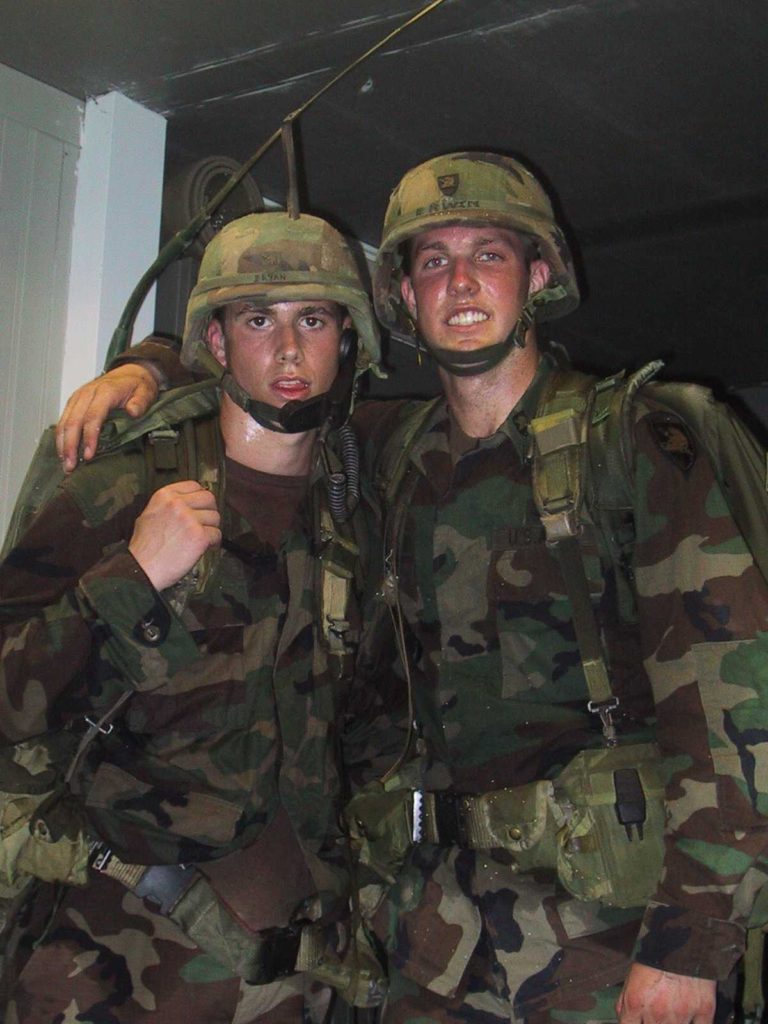
Jeff and Mike during West Point’s Cadet Field Training in July 2001.
They both wanted to start something that would contribute to Chris’s legacy. That would expose people to the transformational research that draws a direct line between authentic relationships and happiness. They wanted to do something, but they weren’t sure what. So they started with a Facebook page. They loaded it with information on positive psychology and the 24 character strengths, called it The Positivity Project, and launched it on what would have been Chris Peterson’s 65th birthday—February 18, 2015.
Perhaps it’s not a surprise that when a teacher saw the page, he knew exactly what he wanted to do. Teach it. To kids. Two of Mike’s childhood friends, a teacher and a principal, wanted to use the content to teach their kids about character. Over long Skype sessions and a crash course on positive psychology, Chris Peterson, and the “other people matter” mindset, Mike and Jeff helped the educators adapt the information. The school, Morgan Road Elementary in Liverpool, New York, launched The Positivity Project in the fall of 2015. The curriculum was far from nailed down or buttoned up, and when Mike and Jeff visited the school for its assembly on Veterans Day that November, they asked the teachers how it was going. The response blew them away: This is the best way we’ve ever taught character education, they said. Every school can use this. You could bring this everywhere. When the pair walked out the front door of the school, they looked at each other and smiled. They knew what they wanted to start.
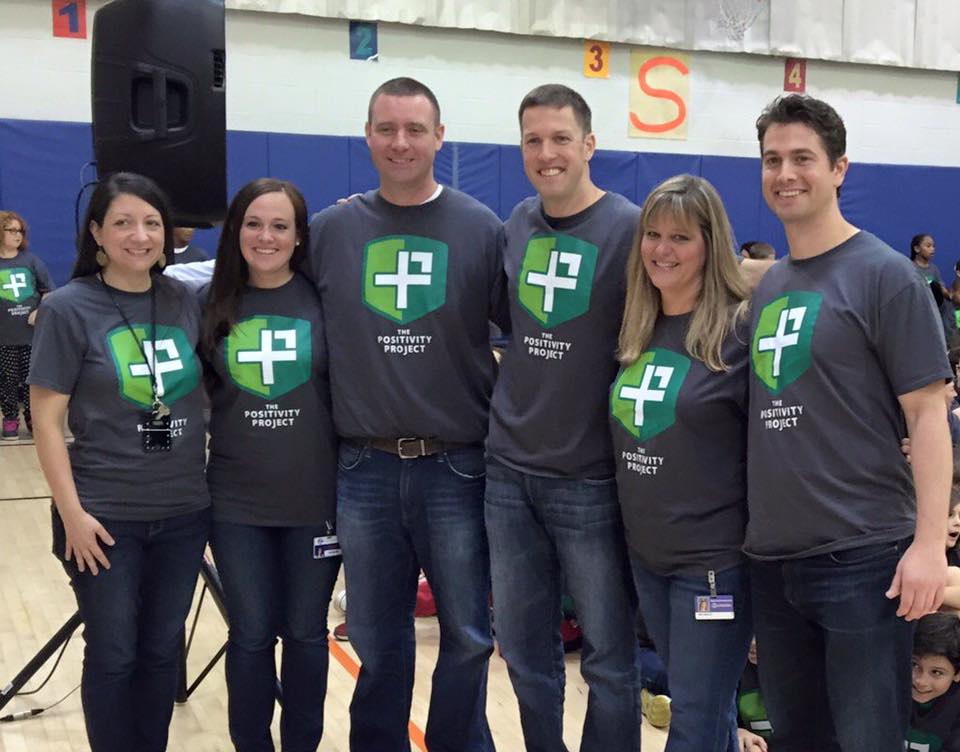
Mike and Jeff alongside the Morgan Road Elementary team in November 2015.
The Positivity Project incorporated as a 501c3 nonprofit on December 7, 2015, and launched in 33 schools in the 2016-2017 academic year. It was a rough year for the country. Animosity over politics was at its zenith. Social media had devolved into a virtual screaming match. Mass shootings were a near weekly occurrence. Rates of loneliness, depression, opioid use, and suicide were growing, especially among young people.
Mike and Jeff spent a lot of time that year thinking about their “why” for The Positivity Project. They thought about how the decline in relationships was a threat to democracy. How there were all sorts of plans to teach kids how to do stuff like read and write and drive, but there wasn’t a plan for teaching them how to build and sustain relationships. How kids would better understand themselves—and by extension, others—if they understood the language of character. How their lives would never lack for meaning and purpose if they understood just how much other people matter. And they thought a lot about how, with a population of young people like that, there would never, ever be a question that this is a country worth fighting for.
Today The Positivity Project is in over 450 schools. Soon, the organization will no longer be just Mike and Jeff as empowering tens of thousands of schools to implement the “P2” will take a full time, dedicated staff. The goal is to be in 10,000 schools by 2030. It’s a big goal, but it’s just the start. There are 98,000 K-12 schools in the country, after all.
98,000 opportunities to bring Chris Peterson’s work to life.


